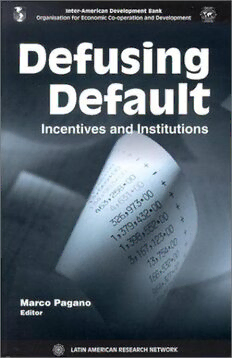
Defusing Default: Incentives and Institutions PDF
375 Pages·2001·18.726 MB·English
Most books are stored in the elastic cloud where traffic is expensive. For this reason, we have a limit on daily download.
Preview Defusing Default: Incentives and Institutions
Description:
How much protection should a country's judicial system afford creditors? The answer has far-reaching implications for the functioning of credit markets, particularly in developing regions such as Latin America, where creditor rights are uneven and enforcement often lax. Defusing Default uses a variety of perspectives and tools, including theoretical modeling and cross-country evidence, to examine the costs and benefits of protecting creditor rights. Case studies look at creditor protection in Argentina, Brazil, Chile, Costa Rica, Paraguay and Peru. The studies find that more effective judicial enforcement would help to make more credit available and improve the overall performance of the credit market. Another finding is that private contracting in credit markets, including information-sharing arrangements, can help compensate for legal deficiencies and create incentives to limit default in countries where judicial enforcement is costly or ineffective. Finally, the book explores the political economy of debt moratoria by examining bailouts and bankruptcy.
See more
The list of books you might like
Most books are stored in the elastic cloud where traffic is expensive. For this reason, we have a limit on daily download.
